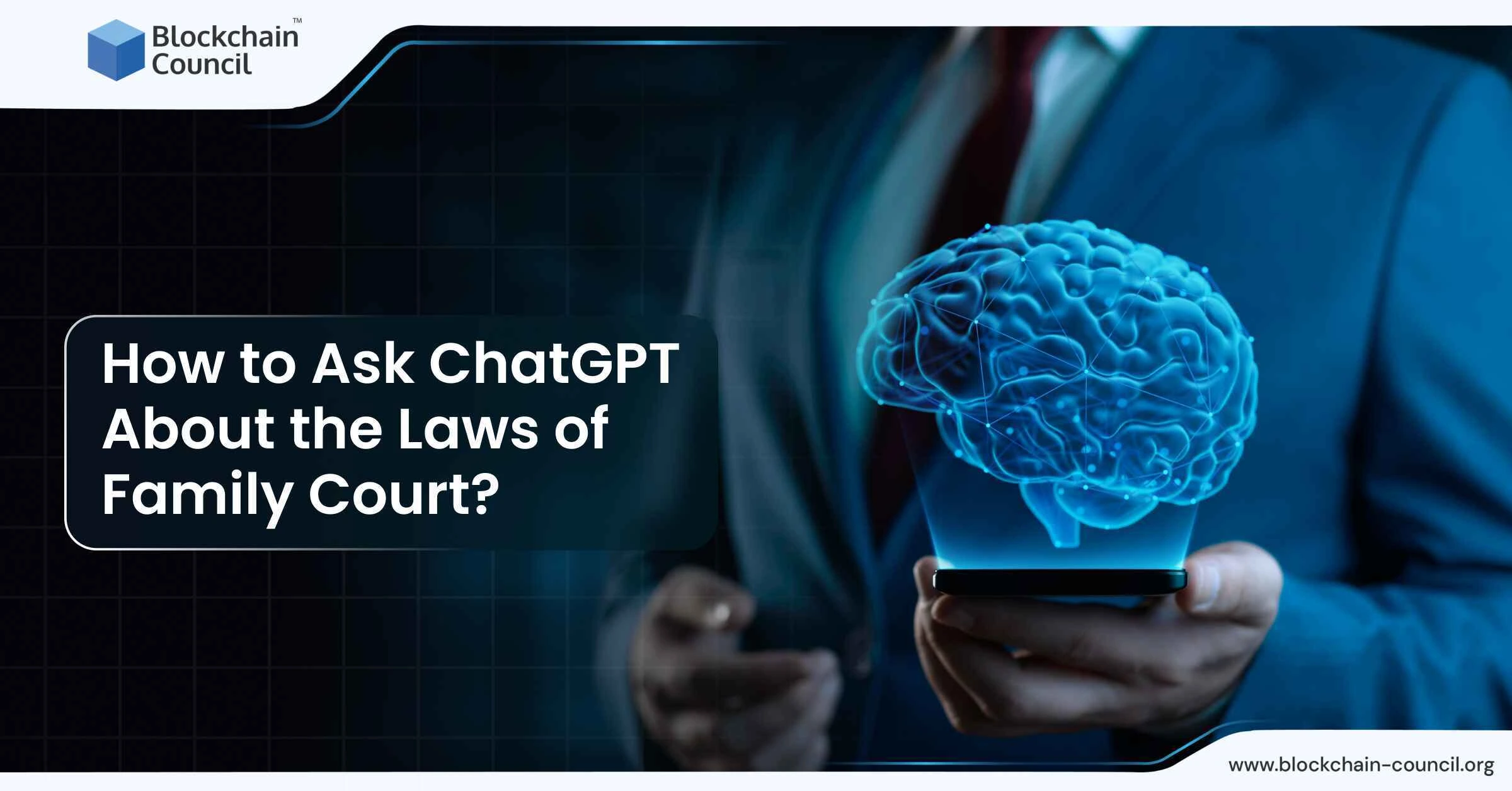
- Blockchain Council
- September 12, 2024
Navigating the complexities of family court can be daunting. With so many questions and legal terms, it can feel overwhelming. Fortunately, ChatGPT offers a way to get preliminary insights into family court laws. However, to get the most accurate and useful answers, it’s important to know how to ask the right questions.
So, how to ask ChatGPT about the laws of family court?
Things to Remember While Asking ChatGPT About the Laws of Family Court
Before you start asking ChatGPT about family court laws, it’s essential to understand that ChatGPT is an AI tool (by OpenAI) designed to provide general information based on its training. It’s not a substitute for professional legal advice, but it can be a valuable resource for initial research or clarifying specific points of law.
So, here’s how to ask ChatGPT about the laws of the family court:
- Be Specific: Broad questions may yield responses that are too general. The more detail you provide, the more tailored the answer will be.
- State Your Jurisdiction: Family laws vary significantly by jurisdiction, so always mention your location to get the most relevant information.
- Clarify the Legal Topic: Family law encompasses a wide range of issues, including divorce, child custody, spousal support, and property division. Specify the exact area of concern.
- Break Down Complex Issues: If your query involves multiple legal aspects, break it down into smaller, more manageable parts. This approach can help ChatGPT provide more focused and useful responses.
To learn crafting prompt effectively and make the most of AI tools like ChatGPT, enroll into globally recognized certifications like the Certified Prompt Engineer™. This certification will ensure you can drive AI models as per your own wish, with the power of effective prompts.
How to Ask ChatGPT About the Laws of Family Court?
Below are examples of how to ask ChatGPT about the laws of family court and the responses from ChatGPT:
- Divorce: “What are the legal grounds for filing for divorce in Florida?”
- ChatGPT’s Response:
- Child Custody: “How do courts in Illinois determine the best interests of a child in custody cases?”
- ChatGPT’s Response:
- Spousal Support: “What criteria do judges in California use to calculate spousal support?”
- ChatGPT’s Response:
- Property Division: “How is marital property divided in community property states like Arizona?”
- ChatGPT’s Response:
Using ChatGPT for Legal Research
Beyond answering direct questions, ChatGPT can assist with preliminary legal research including research in matters of family law. For example, you might ask it to summarize key concepts related to your case, define legal terms, or outline the general procedures involved in family court proceedings. However, always cross-reference this information with reliable legal sources or consult with a lawyer to ensure accuracy.
Sample Research Prompts:
- Prompt: “Summarize the main steps involved in filing for divorce in Massachusetts.”
- ChatGPT’s Response:
- Prompt: “What are the implications of the ‘best interest of the child’ standard?”
- ChatGPT’s Response:
How to Interpret and Verify ChatGPT’s Responses?
After receiving a response from ChatGPT, it’s essential to interpret the information within the broader legal context. ChatGPT bases its answers on general knowledge, which may not account for specific legal nuances. Therefore, use the AI’s response as a starting point for further research or as a way to prepare for a conversation with a legal professional.
For instance, it might give you an overview of how child custody decisions are made, but it won’t capture the nuances of your specific case. Therefore, after receiving a response from ChatGPT, it’s wise to cross-reference it with other reliable legal sources or consult with a legal professional to ensure its accuracy.
Further, if a response seems too general or unclear, follow up with more targeted questions. For example, if ChatGPT provides a general overview of custody laws, you might ask, “Can you explain how joint custody decisions are typically handled in New Jersey?”
Ethical Considerations and Limitations
While ChatGPT can be an invaluable tool for preliminary research, it’s essential to acknowledge its limitations:
- Not a Substitute for Legal Advice: ChatGPT can provide general information, but it cannot offer legal advice tailored to your specific case. Always consult a lawyer for legal matters requiring professional judgment.
- Risk of Outdated or Inaccurate Information: Family laws change frequently, and ChatGPT’s responses may not always reflect the most current laws. Double-check any legal information with up-to-date resources.
- Ethical Consideration: Ethically, when using ChatGPT, avoid sharing personal details or specific case information that could compromise your privacy. Since the AI does not offer confidential legal advice, keeping questions general protects your sensitive information.
Conclusion
ChatGPT is a powerful tool for gathering initial insights into family court laws. By asking well-framed, specific questions and understanding its limitations, you can use it to enhance your legal knowledge. However, for any serious legal matter, always rely on a qualified attorney for advice tailored to your situation.
Remember, while ChatGPT can provide information, it can’t replace the nuanced expertise of a legal professional. Now that you know how to ask ChatGPT about the laws of family court, always use it as a supplement to—not a replacement for—professional legal advice.











































































 Guides
Guides News
News Blockchain
Blockchain Cryptocurrency
& Digital Assets
Cryptocurrency
& Digital Assets Web3
Web3 Metaverse & NFTs
Metaverse & NFTs
